Leadership and Management Development: UAE to Japan Shift
VerifiedAdded on 2022/12/01
|10
|2380
|135
Report
AI Summary
This report delves into the critical aspects of leadership and management development within the context of a business expansion from the United Arab Emirates to Japan. It emphasizes the significance of cultural awareness training for human resource executives to navigate the cultural differences, including power distance, individualism, masculinity, uncertainty avoidance, long-term orientation, and indulgence. The report underscores the importance of understanding these cultural dimensions for effective management and highlights the need for ethical business practices in Japan. It discusses the benefits of cultural awareness training, such as improved communication, team performance, and the development of positive relationships among employees. The analysis provides a comprehensive overview of how to address and manage cultural differences, ensuring a successful business transition and fostering a sustainable business environment. The report also touches on the impact of these factors on the business's ability to achieve its goals, with a focus on the importance of ethical considerations and responsible management practices.
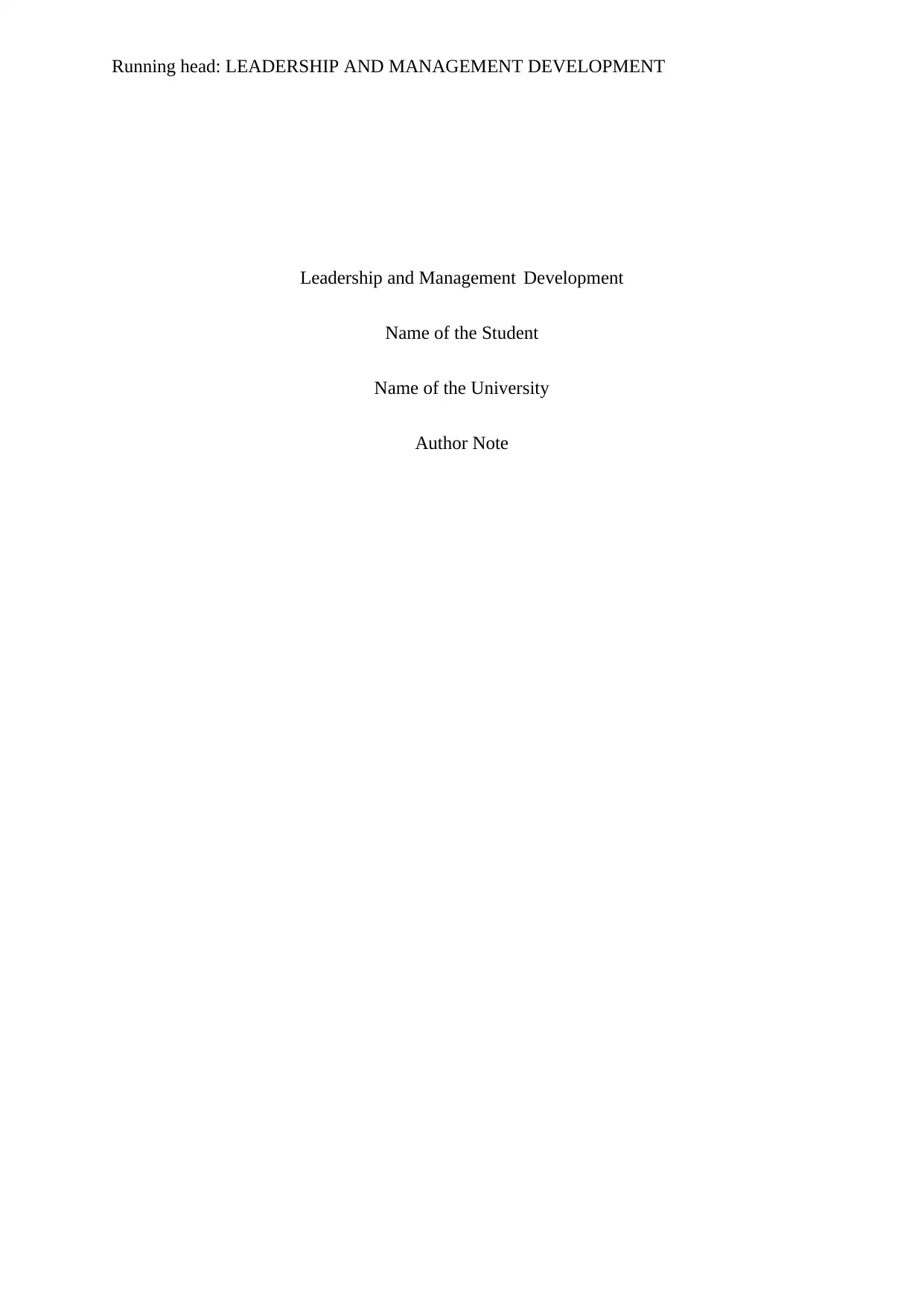
Running head: LEADERSHIP AND MANAGEMENT DEVELOPMENT
Leadership and Management Development
Name of the Student
Name of the University
Author Note
Leadership and Management Development
Name of the Student
Name of the University
Author Note
Paraphrase This Document
Need a fresh take? Get an instant paraphrase of this document with our AI Paraphraser

1LEADERSHIP AND MANAGEMENT DEVELOPMENT
Table of Contents
Introduction:...............................................................................................................................3
Discussion:.................................................................................................................................3
Conclusion:................................................................................................................................7
References:.................................................................................................................................8
Table of Contents
Introduction:...............................................................................................................................3
Discussion:.................................................................................................................................3
Conclusion:................................................................................................................................7
References:.................................................................................................................................8
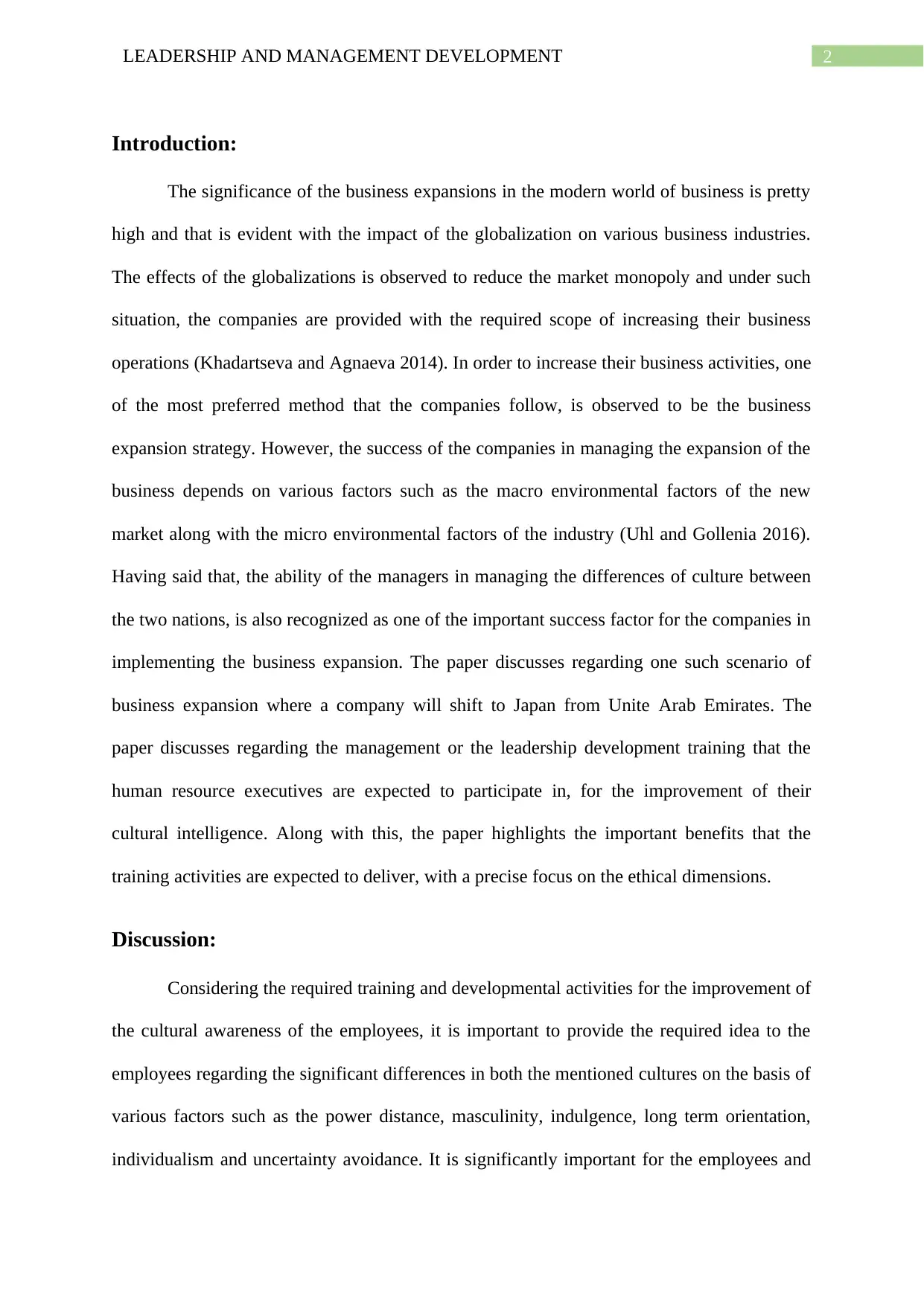
2LEADERSHIP AND MANAGEMENT DEVELOPMENT
Introduction:
The significance of the business expansions in the modern world of business is pretty
high and that is evident with the impact of the globalization on various business industries.
The effects of the globalizations is observed to reduce the market monopoly and under such
situation, the companies are provided with the required scope of increasing their business
operations (Khadartseva and Agnaeva 2014). In order to increase their business activities, one
of the most preferred method that the companies follow, is observed to be the business
expansion strategy. However, the success of the companies in managing the expansion of the
business depends on various factors such as the macro environmental factors of the new
market along with the micro environmental factors of the industry (Uhl and Gollenia 2016).
Having said that, the ability of the managers in managing the differences of culture between
the two nations, is also recognized as one of the important success factor for the companies in
implementing the business expansion. The paper discusses regarding one such scenario of
business expansion where a company will shift to Japan from Unite Arab Emirates. The
paper discusses regarding the management or the leadership development training that the
human resource executives are expected to participate in, for the improvement of their
cultural intelligence. Along with this, the paper highlights the important benefits that the
training activities are expected to deliver, with a precise focus on the ethical dimensions.
Discussion:
Considering the required training and developmental activities for the improvement of
the cultural awareness of the employees, it is important to provide the required idea to the
employees regarding the significant differences in both the mentioned cultures on the basis of
various factors such as the power distance, masculinity, indulgence, long term orientation,
individualism and uncertainty avoidance. It is significantly important for the employees and
Introduction:
The significance of the business expansions in the modern world of business is pretty
high and that is evident with the impact of the globalization on various business industries.
The effects of the globalizations is observed to reduce the market monopoly and under such
situation, the companies are provided with the required scope of increasing their business
operations (Khadartseva and Agnaeva 2014). In order to increase their business activities, one
of the most preferred method that the companies follow, is observed to be the business
expansion strategy. However, the success of the companies in managing the expansion of the
business depends on various factors such as the macro environmental factors of the new
market along with the micro environmental factors of the industry (Uhl and Gollenia 2016).
Having said that, the ability of the managers in managing the differences of culture between
the two nations, is also recognized as one of the important success factor for the companies in
implementing the business expansion. The paper discusses regarding one such scenario of
business expansion where a company will shift to Japan from Unite Arab Emirates. The
paper discusses regarding the management or the leadership development training that the
human resource executives are expected to participate in, for the improvement of their
cultural intelligence. Along with this, the paper highlights the important benefits that the
training activities are expected to deliver, with a precise focus on the ethical dimensions.
Discussion:
Considering the required training and developmental activities for the improvement of
the cultural awareness of the employees, it is important to provide the required idea to the
employees regarding the significant differences in both the mentioned cultures on the basis of
various factors such as the power distance, masculinity, indulgence, long term orientation,
individualism and uncertainty avoidance. It is significantly important for the employees and
⊘ This is a preview!⊘
Do you want full access?
Subscribe today to unlock all pages.

Trusted by 1+ million students worldwide
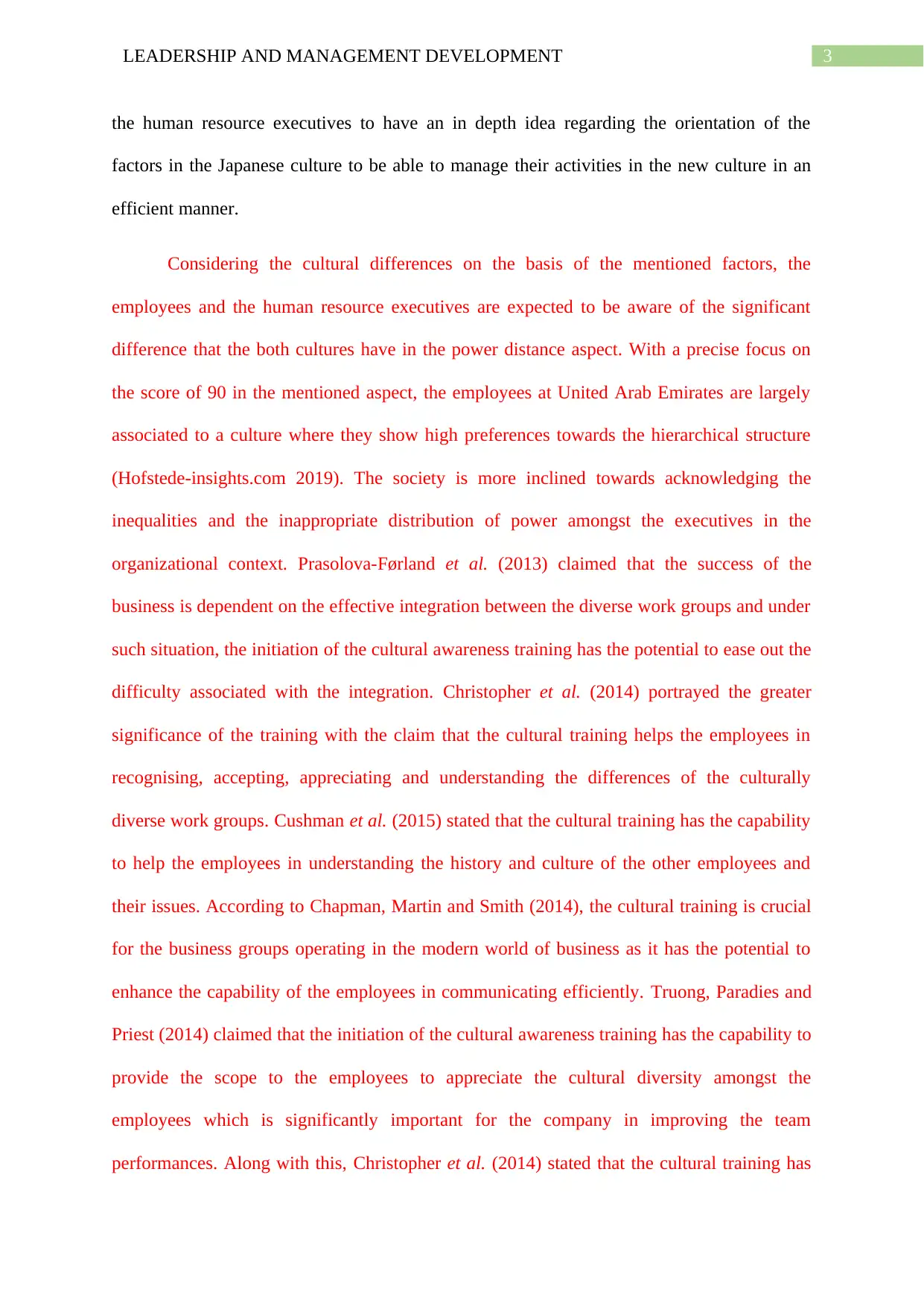
3LEADERSHIP AND MANAGEMENT DEVELOPMENT
the human resource executives to have an in depth idea regarding the orientation of the
factors in the Japanese culture to be able to manage their activities in the new culture in an
efficient manner.
Considering the cultural differences on the basis of the mentioned factors, the
employees and the human resource executives are expected to be aware of the significant
difference that the both cultures have in the power distance aspect. With a precise focus on
the score of 90 in the mentioned aspect, the employees at United Arab Emirates are largely
associated to a culture where they show high preferences towards the hierarchical structure
(Hofstede-insights.com 2019). The society is more inclined towards acknowledging the
inequalities and the inappropriate distribution of power amongst the executives in the
organizational context. Prasolova-Førland et al. (2013) claimed that the success of the
business is dependent on the effective integration between the diverse work groups and under
such situation, the initiation of the cultural awareness training has the potential to ease out the
difficulty associated with the integration. Christopher et al. (2014) portrayed the greater
significance of the training with the claim that the cultural training helps the employees in
recognising, accepting, appreciating and understanding the differences of the culturally
diverse work groups. Cushman et al. (2015) stated that the cultural training has the capability
to help the employees in understanding the history and culture of the other employees and
their issues. According to Chapman, Martin and Smith (2014), the cultural training is crucial
for the business groups operating in the modern world of business as it has the potential to
enhance the capability of the employees in communicating efficiently. Truong, Paradies and
Priest (2014) claimed that the initiation of the cultural awareness training has the capability to
provide the scope to the employees to appreciate the cultural diversity amongst the
employees which is significantly important for the company in improving the team
performances. Along with this, Christopher et al. (2014) stated that the cultural training has
the human resource executives to have an in depth idea regarding the orientation of the
factors in the Japanese culture to be able to manage their activities in the new culture in an
efficient manner.
Considering the cultural differences on the basis of the mentioned factors, the
employees and the human resource executives are expected to be aware of the significant
difference that the both cultures have in the power distance aspect. With a precise focus on
the score of 90 in the mentioned aspect, the employees at United Arab Emirates are largely
associated to a culture where they show high preferences towards the hierarchical structure
(Hofstede-insights.com 2019). The society is more inclined towards acknowledging the
inequalities and the inappropriate distribution of power amongst the executives in the
organizational context. Prasolova-Førland et al. (2013) claimed that the success of the
business is dependent on the effective integration between the diverse work groups and under
such situation, the initiation of the cultural awareness training has the potential to ease out the
difficulty associated with the integration. Christopher et al. (2014) portrayed the greater
significance of the training with the claim that the cultural training helps the employees in
recognising, accepting, appreciating and understanding the differences of the culturally
diverse work groups. Cushman et al. (2015) stated that the cultural training has the capability
to help the employees in understanding the history and culture of the other employees and
their issues. According to Chapman, Martin and Smith (2014), the cultural training is crucial
for the business groups operating in the modern world of business as it has the potential to
enhance the capability of the employees in communicating efficiently. Truong, Paradies and
Priest (2014) claimed that the initiation of the cultural awareness training has the capability to
provide the scope to the employees to appreciate the cultural diversity amongst the
employees which is significantly important for the company in improving the team
performances. Along with this, Christopher et al. (2014) stated that the cultural training has
Paraphrase This Document
Need a fresh take? Get an instant paraphrase of this document with our AI Paraphraser
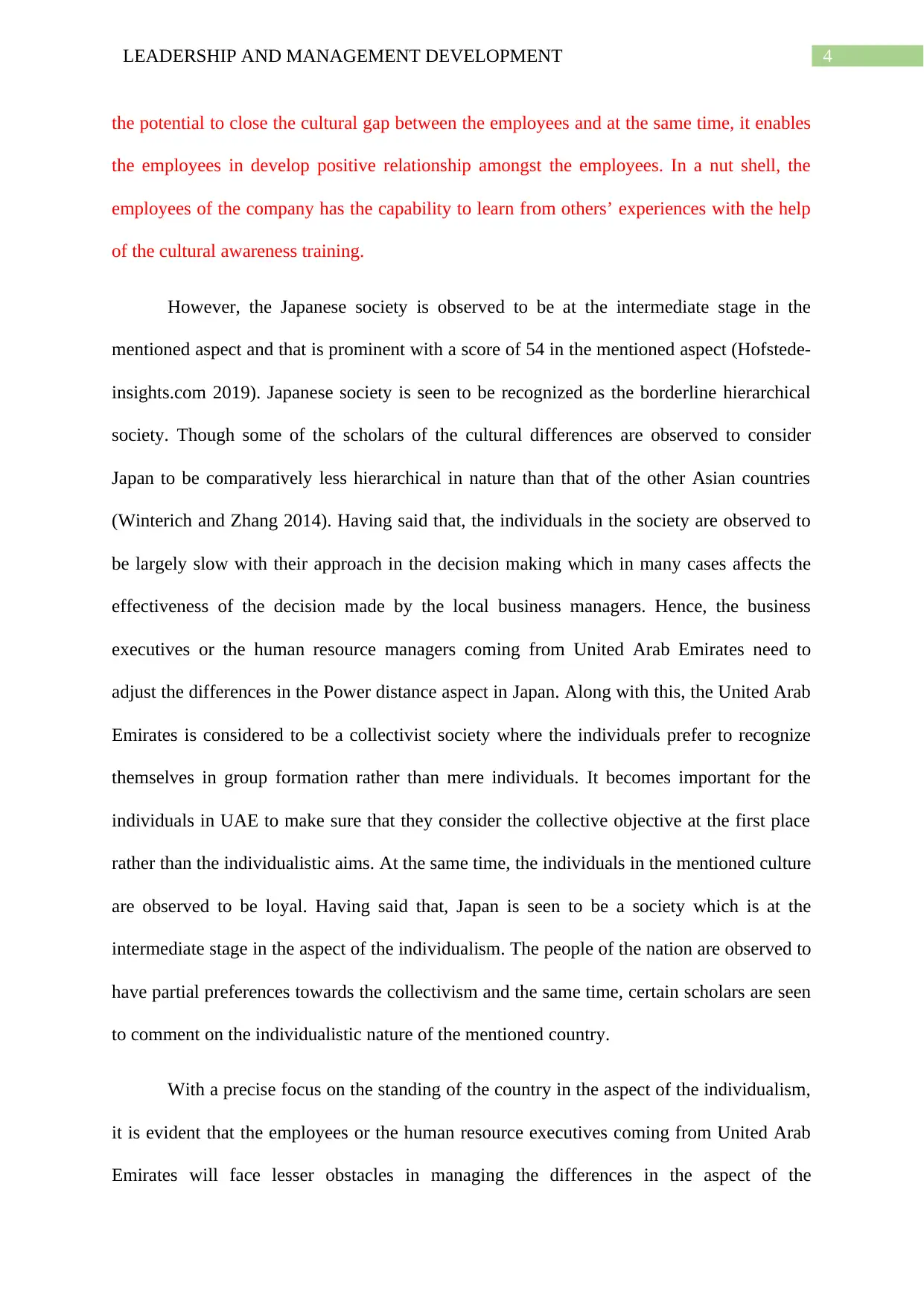
4LEADERSHIP AND MANAGEMENT DEVELOPMENT
the potential to close the cultural gap between the employees and at the same time, it enables
the employees in develop positive relationship amongst the employees. In a nut shell, the
employees of the company has the capability to learn from others’ experiences with the help
of the cultural awareness training.
However, the Japanese society is observed to be at the intermediate stage in the
mentioned aspect and that is prominent with a score of 54 in the mentioned aspect (Hofstede-
insights.com 2019). Japanese society is seen to be recognized as the borderline hierarchical
society. Though some of the scholars of the cultural differences are observed to consider
Japan to be comparatively less hierarchical in nature than that of the other Asian countries
(Winterich and Zhang 2014). Having said that, the individuals in the society are observed to
be largely slow with their approach in the decision making which in many cases affects the
effectiveness of the decision made by the local business managers. Hence, the business
executives or the human resource managers coming from United Arab Emirates need to
adjust the differences in the Power distance aspect in Japan. Along with this, the United Arab
Emirates is considered to be a collectivist society where the individuals prefer to recognize
themselves in group formation rather than mere individuals. It becomes important for the
individuals in UAE to make sure that they consider the collective objective at the first place
rather than the individualistic aims. At the same time, the individuals in the mentioned culture
are observed to be loyal. Having said that, Japan is seen to be a society which is at the
intermediate stage in the aspect of the individualism. The people of the nation are observed to
have partial preferences towards the collectivism and the same time, certain scholars are seen
to comment on the individualistic nature of the mentioned country.
With a precise focus on the standing of the country in the aspect of the individualism,
it is evident that the employees or the human resource executives coming from United Arab
Emirates will face lesser obstacles in managing the differences in the aspect of the
the potential to close the cultural gap between the employees and at the same time, it enables
the employees in develop positive relationship amongst the employees. In a nut shell, the
employees of the company has the capability to learn from others’ experiences with the help
of the cultural awareness training.
However, the Japanese society is observed to be at the intermediate stage in the
mentioned aspect and that is prominent with a score of 54 in the mentioned aspect (Hofstede-
insights.com 2019). Japanese society is seen to be recognized as the borderline hierarchical
society. Though some of the scholars of the cultural differences are observed to consider
Japan to be comparatively less hierarchical in nature than that of the other Asian countries
(Winterich and Zhang 2014). Having said that, the individuals in the society are observed to
be largely slow with their approach in the decision making which in many cases affects the
effectiveness of the decision made by the local business managers. Hence, the business
executives or the human resource managers coming from United Arab Emirates need to
adjust the differences in the Power distance aspect in Japan. Along with this, the United Arab
Emirates is considered to be a collectivist society where the individuals prefer to recognize
themselves in group formation rather than mere individuals. It becomes important for the
individuals in UAE to make sure that they consider the collective objective at the first place
rather than the individualistic aims. At the same time, the individuals in the mentioned culture
are observed to be loyal. Having said that, Japan is seen to be a society which is at the
intermediate stage in the aspect of the individualism. The people of the nation are observed to
have partial preferences towards the collectivism and the same time, certain scholars are seen
to comment on the individualistic nature of the mentioned country.
With a precise focus on the standing of the country in the aspect of the individualism,
it is evident that the employees or the human resource executives coming from United Arab
Emirates will face lesser obstacles in managing the differences in the aspect of the
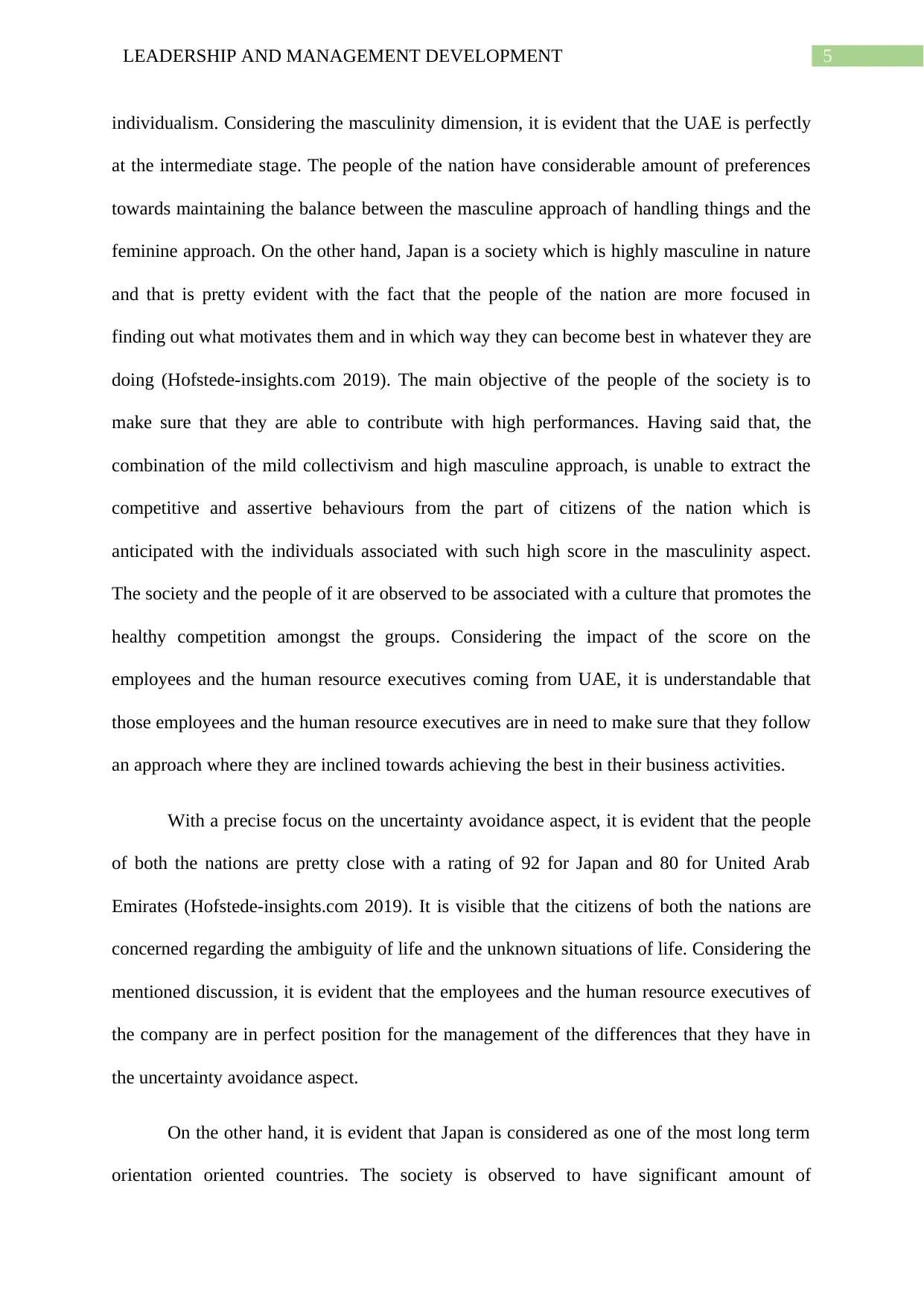
5LEADERSHIP AND MANAGEMENT DEVELOPMENT
individualism. Considering the masculinity dimension, it is evident that the UAE is perfectly
at the intermediate stage. The people of the nation have considerable amount of preferences
towards maintaining the balance between the masculine approach of handling things and the
feminine approach. On the other hand, Japan is a society which is highly masculine in nature
and that is pretty evident with the fact that the people of the nation are more focused in
finding out what motivates them and in which way they can become best in whatever they are
doing (Hofstede-insights.com 2019). The main objective of the people of the society is to
make sure that they are able to contribute with high performances. Having said that, the
combination of the mild collectivism and high masculine approach, is unable to extract the
competitive and assertive behaviours from the part of citizens of the nation which is
anticipated with the individuals associated with such high score in the masculinity aspect.
The society and the people of it are observed to be associated with a culture that promotes the
healthy competition amongst the groups. Considering the impact of the score on the
employees and the human resource executives coming from UAE, it is understandable that
those employees and the human resource executives are in need to make sure that they follow
an approach where they are inclined towards achieving the best in their business activities.
With a precise focus on the uncertainty avoidance aspect, it is evident that the people
of both the nations are pretty close with a rating of 92 for Japan and 80 for United Arab
Emirates (Hofstede-insights.com 2019). It is visible that the citizens of both the nations are
concerned regarding the ambiguity of life and the unknown situations of life. Considering the
mentioned discussion, it is evident that the employees and the human resource executives of
the company are in perfect position for the management of the differences that they have in
the uncertainty avoidance aspect.
On the other hand, it is evident that Japan is considered as one of the most long term
orientation oriented countries. The society is observed to have significant amount of
individualism. Considering the masculinity dimension, it is evident that the UAE is perfectly
at the intermediate stage. The people of the nation have considerable amount of preferences
towards maintaining the balance between the masculine approach of handling things and the
feminine approach. On the other hand, Japan is a society which is highly masculine in nature
and that is pretty evident with the fact that the people of the nation are more focused in
finding out what motivates them and in which way they can become best in whatever they are
doing (Hofstede-insights.com 2019). The main objective of the people of the society is to
make sure that they are able to contribute with high performances. Having said that, the
combination of the mild collectivism and high masculine approach, is unable to extract the
competitive and assertive behaviours from the part of citizens of the nation which is
anticipated with the individuals associated with such high score in the masculinity aspect.
The society and the people of it are observed to be associated with a culture that promotes the
healthy competition amongst the groups. Considering the impact of the score on the
employees and the human resource executives coming from UAE, it is understandable that
those employees and the human resource executives are in need to make sure that they follow
an approach where they are inclined towards achieving the best in their business activities.
With a precise focus on the uncertainty avoidance aspect, it is evident that the people
of both the nations are pretty close with a rating of 92 for Japan and 80 for United Arab
Emirates (Hofstede-insights.com 2019). It is visible that the citizens of both the nations are
concerned regarding the ambiguity of life and the unknown situations of life. Considering the
mentioned discussion, it is evident that the employees and the human resource executives of
the company are in perfect position for the management of the differences that they have in
the uncertainty avoidance aspect.
On the other hand, it is evident that Japan is considered as one of the most long term
orientation oriented countries. The society is observed to have significant amount of
⊘ This is a preview!⊘
Do you want full access?
Subscribe today to unlock all pages.

Trusted by 1+ million students worldwide
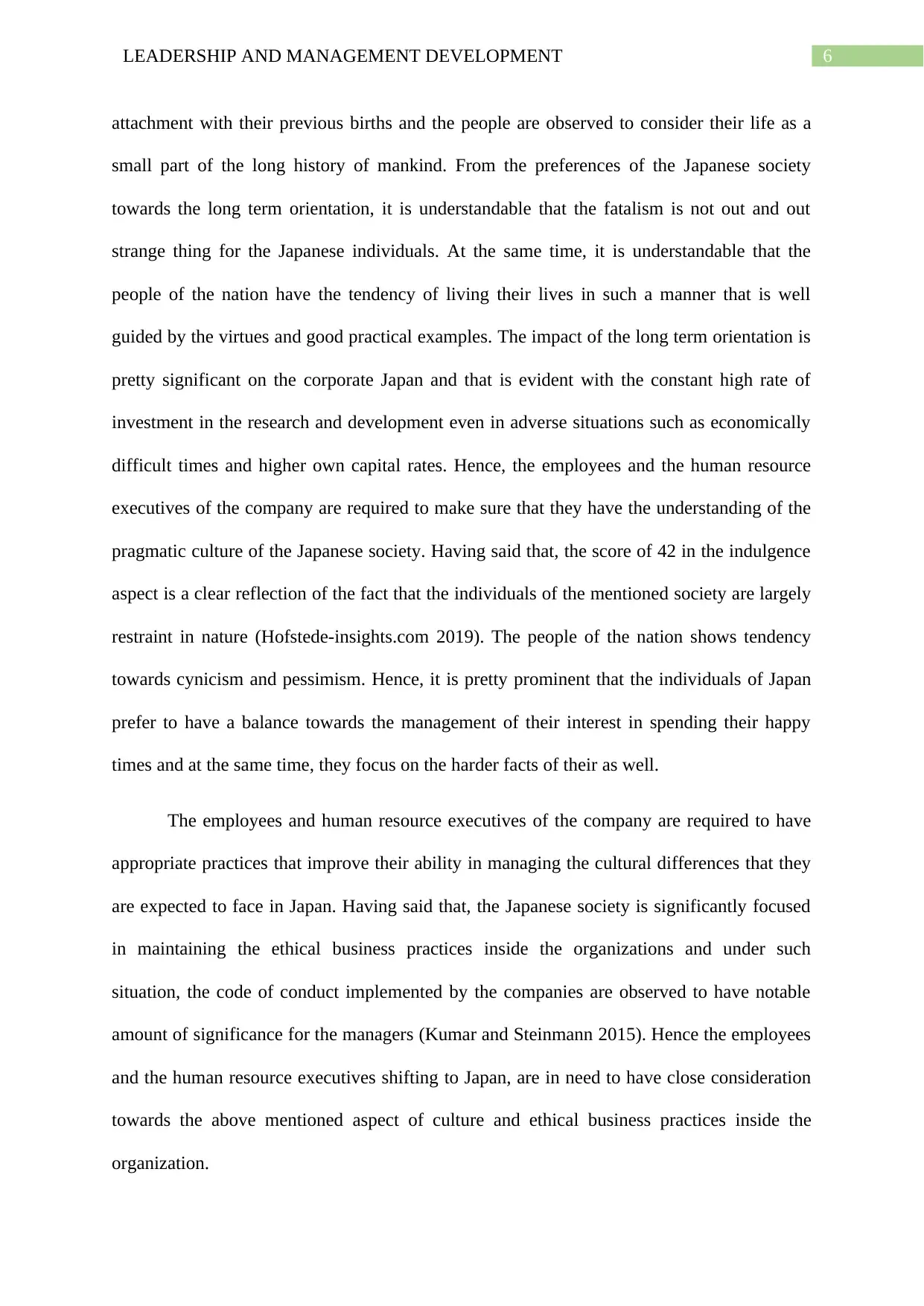
6LEADERSHIP AND MANAGEMENT DEVELOPMENT
attachment with their previous births and the people are observed to consider their life as a
small part of the long history of mankind. From the preferences of the Japanese society
towards the long term orientation, it is understandable that the fatalism is not out and out
strange thing for the Japanese individuals. At the same time, it is understandable that the
people of the nation have the tendency of living their lives in such a manner that is well
guided by the virtues and good practical examples. The impact of the long term orientation is
pretty significant on the corporate Japan and that is evident with the constant high rate of
investment in the research and development even in adverse situations such as economically
difficult times and higher own capital rates. Hence, the employees and the human resource
executives of the company are required to make sure that they have the understanding of the
pragmatic culture of the Japanese society. Having said that, the score of 42 in the indulgence
aspect is a clear reflection of the fact that the individuals of the mentioned society are largely
restraint in nature (Hofstede-insights.com 2019). The people of the nation shows tendency
towards cynicism and pessimism. Hence, it is pretty prominent that the individuals of Japan
prefer to have a balance towards the management of their interest in spending their happy
times and at the same time, they focus on the harder facts of their as well.
The employees and human resource executives of the company are required to have
appropriate practices that improve their ability in managing the cultural differences that they
are expected to face in Japan. Having said that, the Japanese society is significantly focused
in maintaining the ethical business practices inside the organizations and under such
situation, the code of conduct implemented by the companies are observed to have notable
amount of significance for the managers (Kumar and Steinmann 2015). Hence the employees
and the human resource executives shifting to Japan, are in need to have close consideration
towards the above mentioned aspect of culture and ethical business practices inside the
organization.
attachment with their previous births and the people are observed to consider their life as a
small part of the long history of mankind. From the preferences of the Japanese society
towards the long term orientation, it is understandable that the fatalism is not out and out
strange thing for the Japanese individuals. At the same time, it is understandable that the
people of the nation have the tendency of living their lives in such a manner that is well
guided by the virtues and good practical examples. The impact of the long term orientation is
pretty significant on the corporate Japan and that is evident with the constant high rate of
investment in the research and development even in adverse situations such as economically
difficult times and higher own capital rates. Hence, the employees and the human resource
executives of the company are required to make sure that they have the understanding of the
pragmatic culture of the Japanese society. Having said that, the score of 42 in the indulgence
aspect is a clear reflection of the fact that the individuals of the mentioned society are largely
restraint in nature (Hofstede-insights.com 2019). The people of the nation shows tendency
towards cynicism and pessimism. Hence, it is pretty prominent that the individuals of Japan
prefer to have a balance towards the management of their interest in spending their happy
times and at the same time, they focus on the harder facts of their as well.
The employees and human resource executives of the company are required to have
appropriate practices that improve their ability in managing the cultural differences that they
are expected to face in Japan. Having said that, the Japanese society is significantly focused
in maintaining the ethical business practices inside the organizations and under such
situation, the code of conduct implemented by the companies are observed to have notable
amount of significance for the managers (Kumar and Steinmann 2015). Hence the employees
and the human resource executives shifting to Japan, are in need to have close consideration
towards the above mentioned aspect of culture and ethical business practices inside the
organization.
Paraphrase This Document
Need a fresh take? Get an instant paraphrase of this document with our AI Paraphraser
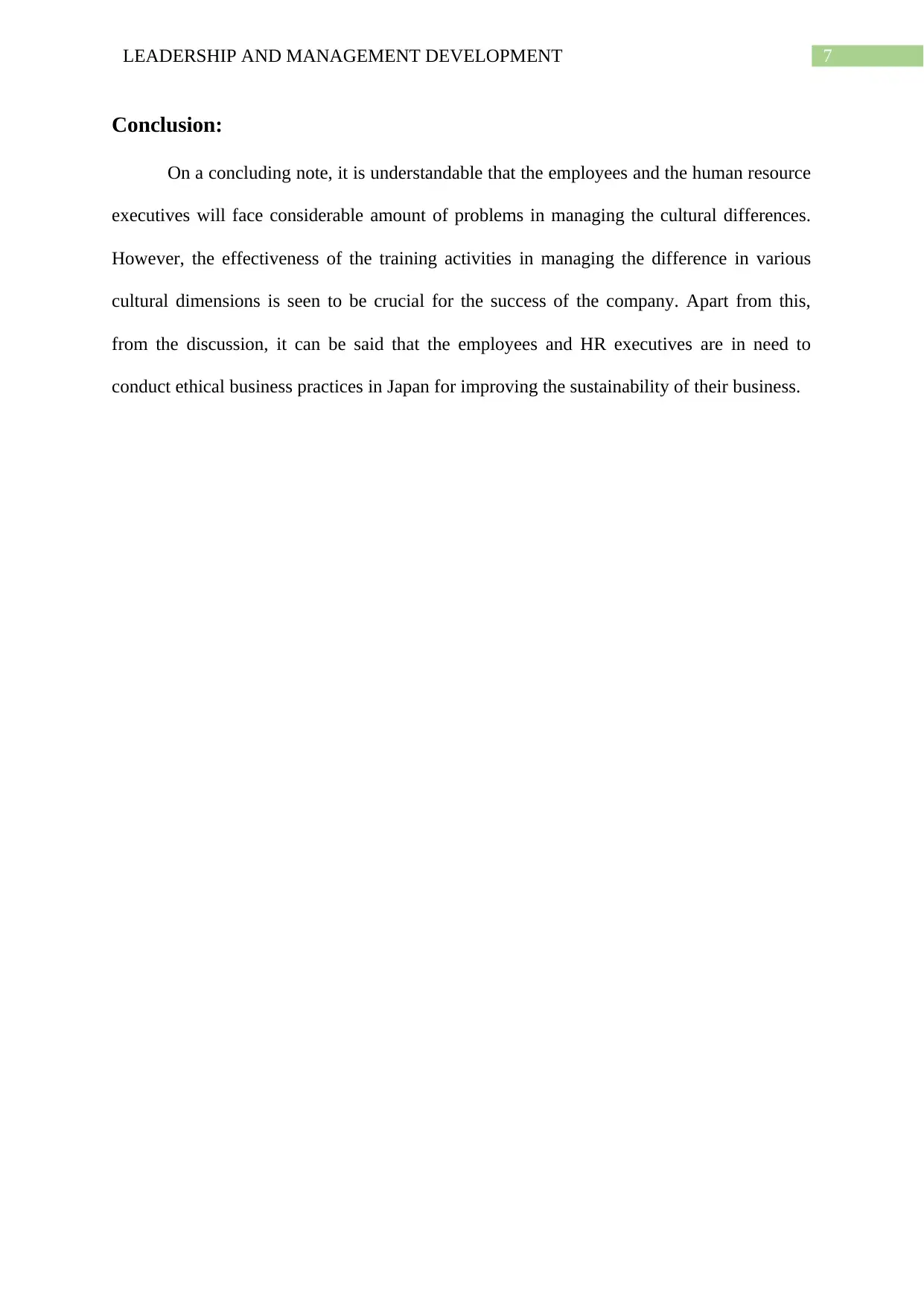
7LEADERSHIP AND MANAGEMENT DEVELOPMENT
Conclusion:
On a concluding note, it is understandable that the employees and the human resource
executives will face considerable amount of problems in managing the cultural differences.
However, the effectiveness of the training activities in managing the difference in various
cultural dimensions is seen to be crucial for the success of the company. Apart from this,
from the discussion, it can be said that the employees and HR executives are in need to
conduct ethical business practices in Japan for improving the sustainability of their business.
Conclusion:
On a concluding note, it is understandable that the employees and the human resource
executives will face considerable amount of problems in managing the cultural differences.
However, the effectiveness of the training activities in managing the difference in various
cultural dimensions is seen to be crucial for the success of the company. Apart from this,
from the discussion, it can be said that the employees and HR executives are in need to
conduct ethical business practices in Japan for improving the sustainability of their business.
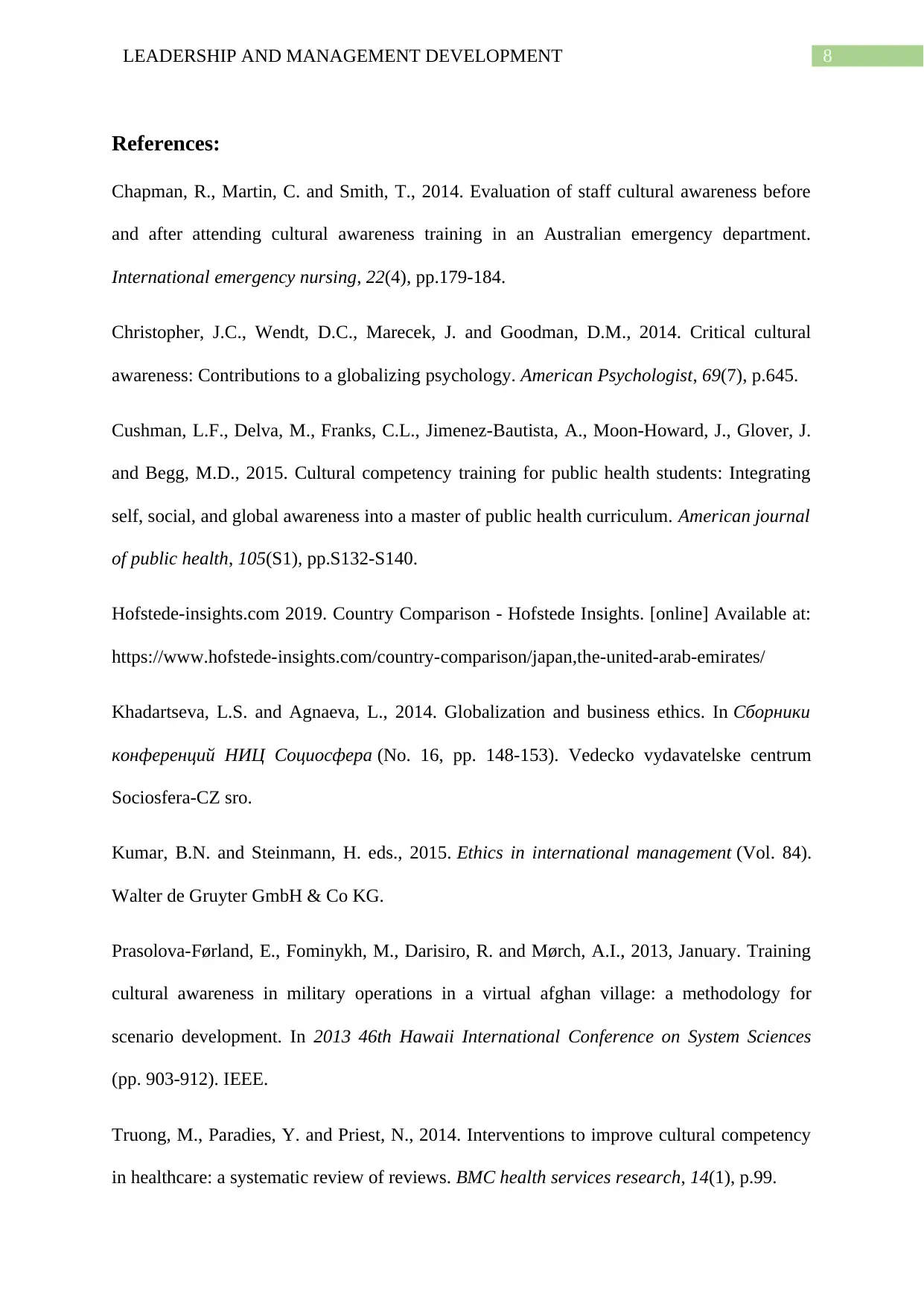
8LEADERSHIP AND MANAGEMENT DEVELOPMENT
References:
Chapman, R., Martin, C. and Smith, T., 2014. Evaluation of staff cultural awareness before
and after attending cultural awareness training in an Australian emergency department.
International emergency nursing, 22(4), pp.179-184.
Christopher, J.C., Wendt, D.C., Marecek, J. and Goodman, D.M., 2014. Critical cultural
awareness: Contributions to a globalizing psychology. American Psychologist, 69(7), p.645.
Cushman, L.F., Delva, M., Franks, C.L., Jimenez-Bautista, A., Moon-Howard, J., Glover, J.
and Begg, M.D., 2015. Cultural competency training for public health students: Integrating
self, social, and global awareness into a master of public health curriculum. American journal
of public health, 105(S1), pp.S132-S140.
Hofstede-insights.com 2019. Country Comparison - Hofstede Insights. [online] Available at:
https://www.hofstede-insights.com/country-comparison/japan,the-united-arab-emirates/
Khadartseva, L.S. and Agnaeva, L., 2014. Globalization and business ethics. In Сборники
конференций НИЦ Социосфера (No. 16, pp. 148-153). Vedecko vydavatelske centrum
Sociosfera-CZ sro.
Kumar, B.N. and Steinmann, H. eds., 2015. Ethics in international management (Vol. 84).
Walter de Gruyter GmbH & Co KG.
Prasolova-Førland, E., Fominykh, M., Darisiro, R. and Mørch, A.I., 2013, January. Training
cultural awareness in military operations in a virtual afghan village: a methodology for
scenario development. In 2013 46th Hawaii International Conference on System Sciences
(pp. 903-912). IEEE.
Truong, M., Paradies, Y. and Priest, N., 2014. Interventions to improve cultural competency
in healthcare: a systematic review of reviews. BMC health services research, 14(1), p.99.
References:
Chapman, R., Martin, C. and Smith, T., 2014. Evaluation of staff cultural awareness before
and after attending cultural awareness training in an Australian emergency department.
International emergency nursing, 22(4), pp.179-184.
Christopher, J.C., Wendt, D.C., Marecek, J. and Goodman, D.M., 2014. Critical cultural
awareness: Contributions to a globalizing psychology. American Psychologist, 69(7), p.645.
Cushman, L.F., Delva, M., Franks, C.L., Jimenez-Bautista, A., Moon-Howard, J., Glover, J.
and Begg, M.D., 2015. Cultural competency training for public health students: Integrating
self, social, and global awareness into a master of public health curriculum. American journal
of public health, 105(S1), pp.S132-S140.
Hofstede-insights.com 2019. Country Comparison - Hofstede Insights. [online] Available at:
https://www.hofstede-insights.com/country-comparison/japan,the-united-arab-emirates/
Khadartseva, L.S. and Agnaeva, L., 2014. Globalization and business ethics. In Сборники
конференций НИЦ Социосфера (No. 16, pp. 148-153). Vedecko vydavatelske centrum
Sociosfera-CZ sro.
Kumar, B.N. and Steinmann, H. eds., 2015. Ethics in international management (Vol. 84).
Walter de Gruyter GmbH & Co KG.
Prasolova-Førland, E., Fominykh, M., Darisiro, R. and Mørch, A.I., 2013, January. Training
cultural awareness in military operations in a virtual afghan village: a methodology for
scenario development. In 2013 46th Hawaii International Conference on System Sciences
(pp. 903-912). IEEE.
Truong, M., Paradies, Y. and Priest, N., 2014. Interventions to improve cultural competency
in healthcare: a systematic review of reviews. BMC health services research, 14(1), p.99.
⊘ This is a preview!⊘
Do you want full access?
Subscribe today to unlock all pages.

Trusted by 1+ million students worldwide
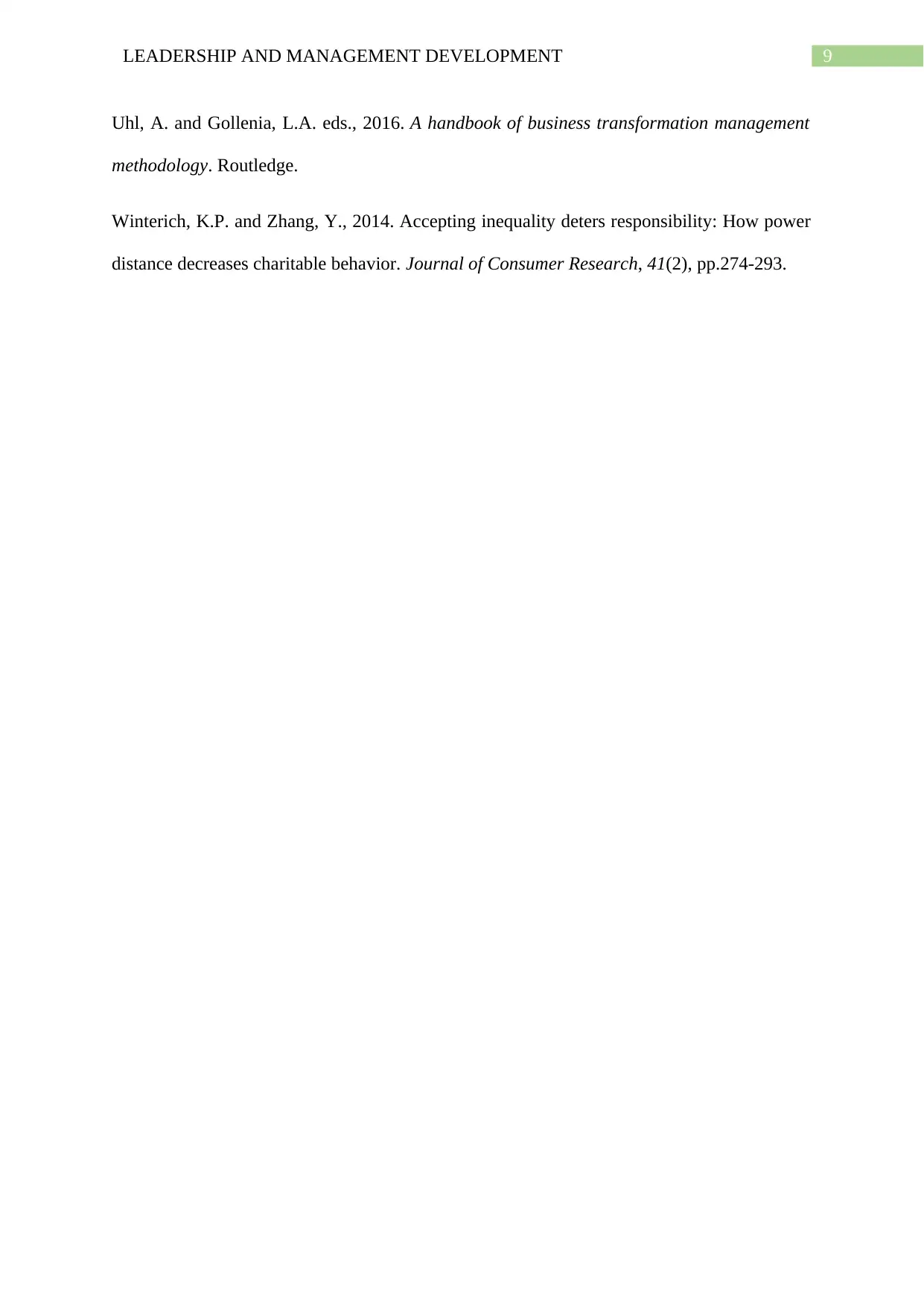
9LEADERSHIP AND MANAGEMENT DEVELOPMENT
Uhl, A. and Gollenia, L.A. eds., 2016. A handbook of business transformation management
methodology. Routledge.
Winterich, K.P. and Zhang, Y., 2014. Accepting inequality deters responsibility: How power
distance decreases charitable behavior. Journal of Consumer Research, 41(2), pp.274-293.
Uhl, A. and Gollenia, L.A. eds., 2016. A handbook of business transformation management
methodology. Routledge.
Winterich, K.P. and Zhang, Y., 2014. Accepting inequality deters responsibility: How power
distance decreases charitable behavior. Journal of Consumer Research, 41(2), pp.274-293.
1 out of 10
Related Documents
Your All-in-One AI-Powered Toolkit for Academic Success.
+13062052269
info@desklib.com
Available 24*7 on WhatsApp / Email
![[object Object]](/_next/static/media/star-bottom.7253800d.svg)
Unlock your academic potential
Copyright © 2020–2026 A2Z Services. All Rights Reserved. Developed and managed by ZUCOL.





